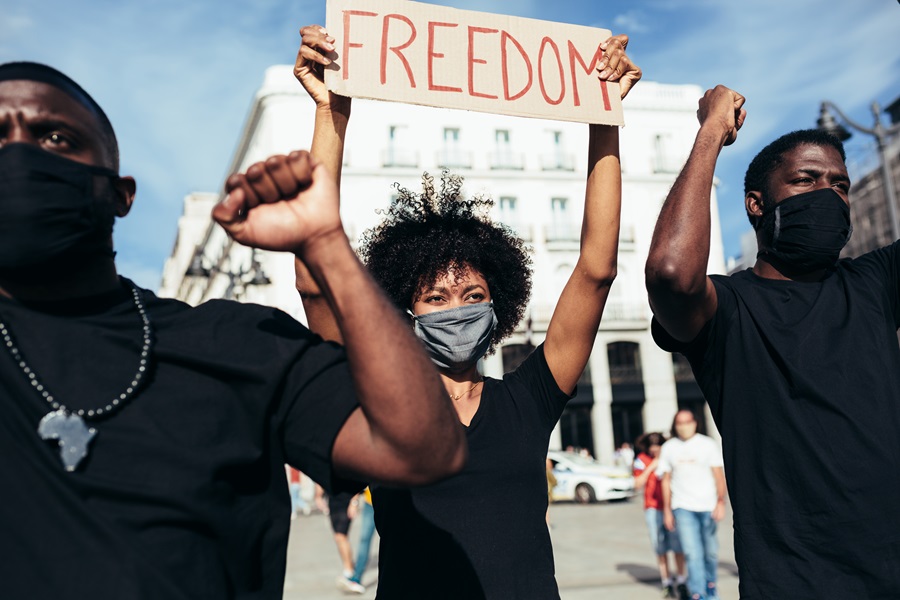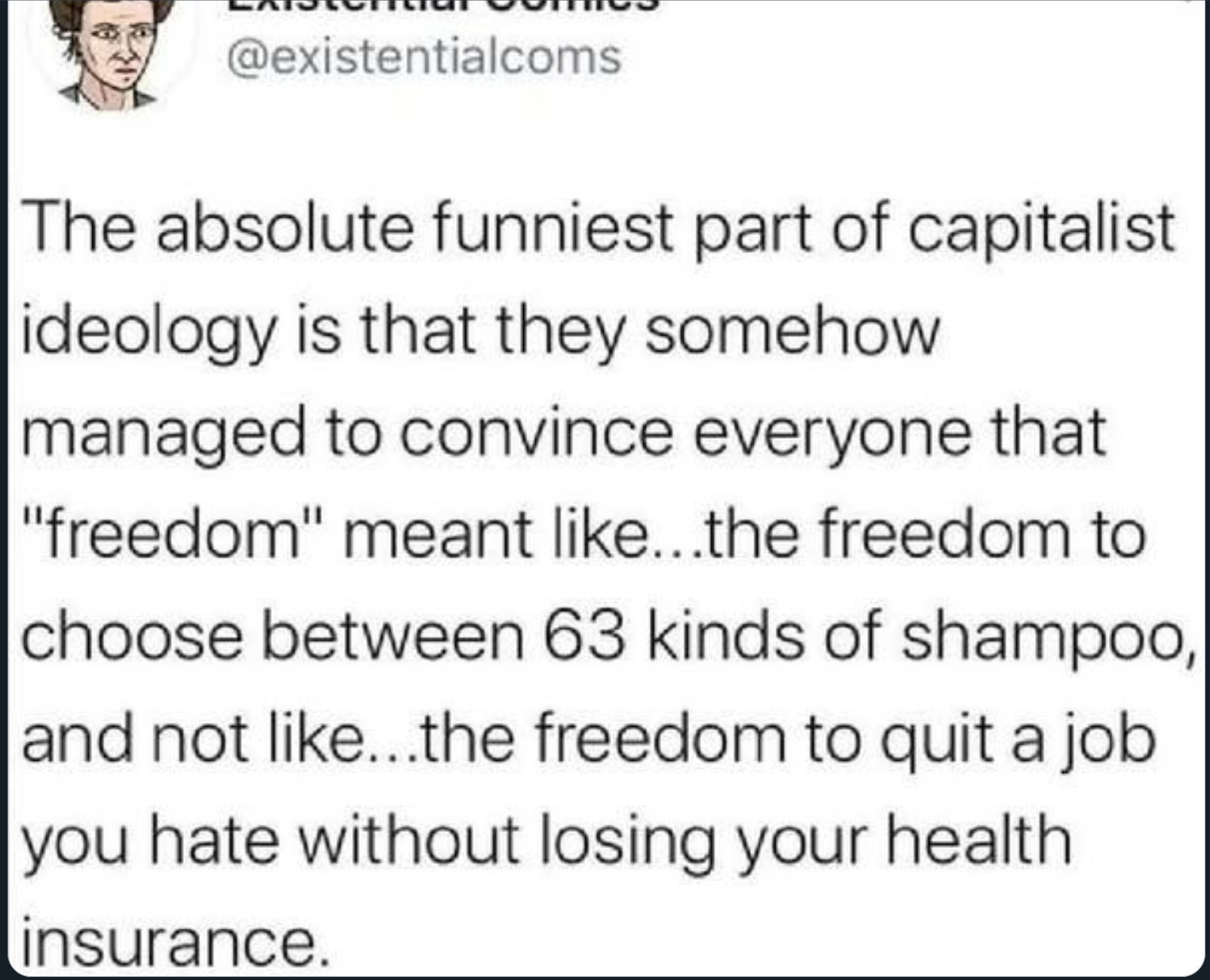Freedom

American libertarianism is obsessively transfixed with the notion of maximizing freedom, and it is the favorite political philosophy of many of the most most powerful people in the world. As such it will serve as a reference point in the discussion of freedom on this page.
"The basis of a democratic state is liberty." -Aristotle
Related pages include: freedom of speech, free will, religious freedom, libertarian, democracy, justice
Freedom and Free Will
What is freedom without free will? If free will is an illusion then freedom must also include instilling people with a full sense of their possible choices. We cannot want what we have never been exposed to, so a robust education is necessary to achieve personal freedom and maximize the range of our free will.
Cultivation of variety is another way to expand possible free will. The more things you try, the easier it becomes to try new things, since novelty becomes a habit. This avoids repetitive habits that limit our possible will, and hence our freedom.
The more you know and more diverse your experience, the more things you can draw on when deciding on a course of action. This complexification of the decision making process is the path to maximum freedom in a world without free will.
Safety and Freedom
A sense of safety is a necessary prerequisite for true freedom. True safety is nice, but the emotional sense of safety is what people actually react to. It's not enough for society to reduce crime, it must also reduce the perception of crime, and provide a sense of general security. This conflicts with the incentives built into capitalist media, which favor fear and outrage.
It is impossible for people to be free in a culture where we are constantly bombarded with negative information. As outlined on the safety page, fear limits our agency, preventing us from making choices that might lead to negative outcomes. When these fears are unfounded, the result is that freedom is decreased much more than safety is increased. When enough unfounded fears are believed, personal freedom becomes severely restricted despite the fact that no laws or economic forces are preventing you.
To experience true freedom, you must rid yourself of all unfounded fears and embrace optimism, hope, and possibility.
Freedom From Social Norms
Taboos and other cultural norms restrict our freedom, since we face social backlash for those transgressions.
Some of these norms are simply matters of politeness that make everyday interactions more positive. Many people have had an upbringing that has taken away their freedom to ask for something without saying please, or to ever use a racial slur. Gaining back these freedoms offers little benefit.
Other norms are oppressive. Norms that restrict the way men and women are able to dress or express their sexuality create significant impediments to happiness for those whose desires are suppressed, with little benefit to the unaffected. The freedom to be outraged about someone's outfit is a legal right, but a social wrong. It hurts both outrager and outragee.
Creating a society that maximizes freedom requires more than a libertarian destruction of the administrative state. It will require a significant refactoring of our social norms and taboos to remove those that only function to inhibit self-expression with outrage, and create new ones that encourage it.
How do we Measure Economic Freedom?
Libertarian politics, popular with crypto-bros, purports to maximize individual freedom by limiting the number of involuntary actions a citizen must take in their life.

As the theory goes, anything you do within the capitalist marketplace is a contract that you can decide to enter into or not, while government action is required and you can be sanctioned for non-compliance. Therefore, the free market cannot limit your freedom because everything is voluntary.
Of course this simplistic theory completely ignores the market forces that make people enter into contracts they don't agree with, face limited selection, depressed wages, and inflated prices due to monopolies. Without strong democratic institutions, the rich will have enormous power and the people will have no way to balance it.
If we were to propose a Gross National Freedom measurement (GNF), then maximizing this value would involve some measure of economic and political equality. If monopoly powers are able to seek rents without adding value, the extra money that everyone is forced to pay is just as detrimental to their freedom as taxes, except with even less benefit and recourse to the payer.
And economic GNF would require that both taxes and rents are minimized and wages are maximized. This is the only way to ensure the libertarian-utilitarian goal of the "most money for the most people."
How do we Measure Political Freedom?
The Libertarian non-aggression principle is actually a pretty decent meterstick of political freedom. As mentioned above, it falls far short on economic grounds, but the notion that any action that does not harm another person or their property should be legal is a fairly decent starting point. Things like freedom of speech, religion, a fair judiciary, etc. are all basic requirements of a free society.
Where the simplistic view falls short is in terms of regulations. Libertarians will argue that regulations encroach on freedom by burdening people with cost, paperwork and delays. These burdens can be onerous, and should be minimized for sure, but this is the cost of prevention and trust. We need to be able to trust that our food, drugs, cars and airplanes are safe, that your apartment building won't collapse in an earthquake or trap you in a fire. That trust didn't exist before regulatory agencies were created to ensure it. And without it, you don't have the freedom to eat unadulterated food, take drugs with known ingredients, have seatbelts, or live in safe buildings.
"If you want to be free, there is but one way; it is to guarantee an equally full measure of liberty to all your neighbors. There is no other." -Carl Schurz
Lack of trust in institutions is debilitating. It causes people to live in fear. It limits our freedom of choice, because if you can't trust product safety you will only choose things you have tried before and know to be safe.
Having a building fall on you is pretty bad for your freedom as well.
Does Freedom Rock?
Yes. Yes, it does.